Brave New World Summary. it is a dystopian novel by English author Aldous Huxley, written in 1931 and published in 1932. Largely set in a futuristic World State, whose citizens are environmentally engineered into an intelligence-based social hierarchy, the novel anticipates huge scientific advancements in reproductive technology, sleep-learning, psychological manipulation and classical conditioning that are combined to make a dystopian society which is challenged by the story's protagonist.
Huxley followed this book with a reassessment in essay form, Brave New World Revisited (1958), and with his final novel, Island (1962), the utopian counterpart. This novel is often compared to George Orwell's Nineteen Eighty-Four (1949).
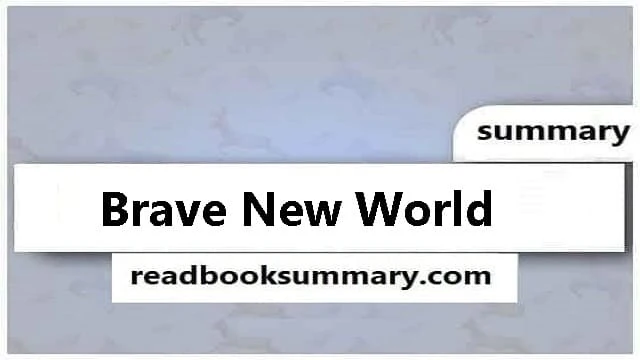 |
| Brave New World Summary |
Brave New World Summary
Brave New World opens in London, nearly six hundred years in the future ("After Ford"). Human life has been almost entirely industrialized — controlled by a few people at the top of a World State.
The first scene, offering a tour of a lab where human beings are created and conditioned according to the society's strict caste system, establishes the antiseptic tone and the theme of dehumanized life. The natural processes of birth, aging, and death represent horrors in this world.
Bernard Marx, an Alpha-Plus (or high-caste) psychologist, emerges as the single discontented person in a world where material comfort and physical pleasure — provided by the drug soma and recreational sex — are the only concerns. Scorned by women, Bernard nevertheless manages to engage the attention of Lenina Crowne, a "pneumatic" beauty who agrees to spend a vacation week with him at the remote Savage Reservation in New Mexico, a place far from the controlled, technological world of London.
Before Bernard leaves, his superior, the D.H.C., spontaneously reveals that long ago he, too, visited the Savage Reservation, and he confesses in sorrow that he lost the woman who accompanied him there. Embarrassed by the disclosure of his socially unacceptable emotion, the D.H.C. turns on Bernard, threatening him with banishment for his own social sins — not engaging enthusiastically enough in sex and soma.
In the Savage Reservation with Lenina, Bernard meets a woman from London who gave birth to a son about 20 years before. Seeing his opportunity to gain power over the D.H.C. — the father of the child — Bernard brings Linda and John back to London and presents them publicly to the D.H.C., who is about to banish Bernard.
Shocked and humiliated by the proof of his horrifying connection with natural birth, the D.H.C. flees in terror. Once a social outcast, Bernard now enjoys great success, because of his association with the new celebrity — John, called "the Savage."
Reared on the traditional ways of the Reservation and an old volume of the poetry of Shakespeare, John finds London strange, confusing, and finally repellent. His quotation of Miranda's line from The Tempest — "O brave new world / That has such people in it" — at first expresses his awe of the "Other Place" his mother told him of as a child. But the quotation becomes ironic as John becomes more and more disgusted by the recreational sex, soma, and identical human beings of London.
Lenina's attempted seduction provokes John's anger and violence, and, later, the death of Linda further arouses his fury. At last, John's attempt to keep a crowd of Deltas from their ration of soma results in a riot and his arrest, along with Bernard and Helmholtz Watson, an "emotional engineer" who wishes to be a poet.
The three face the judgment of World Controller Mustapha Mond, who acknowledges the flaws of this brave new world, but pronounces the loss of freedom and individuality a small price to pay for stability. Mond banishes Bernard and Helmholtz to the Falkland Islands and rules that John must stay in London
When his two friends leave for their exile, John determines to make a retreat for himself in a remote, secluded lighthouse outside the city. There he tries to purify himself of civilization with ritual whippings and vomiting.
Drawn by the spectacle of his wild penances, reporters and crowds press in on John, who becomes a public curiosity — a kind of human animal in a zoo. When Lenina appears in the crowd, John furiously attacks her with the whip. John's frenzy inflames the crowd, and, in accordance with their social training, the violence turns into a sexual orgy, with John drawn in more or less unwillingly.
The next day, when John awakes from the effects of the soma, he realizes in horror what he has done. The novel closes on an image of John's body, hanging lifeless from a wooden beam in his lighthouse retreat.
You may also like to read: Things Fall Apart Book Summary
Brave New World Themes
Individuality vs. Conformity: The novel paints a stark contrast between the World State's emphasis on conformity and John's desire for individual expression. John's emotional outbursts and rejection of soma highlight the conflict between individual freedom and societal pressure. This theme prompts readers to consider the value of individuality and the potential dangers of sacrificing it for stability.
Technology and its Consequences: The World State's reliance on advanced technology, from decanting and conditioning to mood-altering drugs, raises questions about the ethical implications of scientific progress. Huxley warns of the potential for technology to control and manipulate individuals, leading to a loss of humanity and authentic experience.
Happiness and its Cost: The novel explores the manufactured happiness of the World State, achieved through pleasure-seeking and instant gratification. While characters like Lenina appear content, John's dissatisfaction exposes the shallowness and emptiness of this happiness. This theme challenges readers to question the true meaning of happiness and whether it can be achieved solely through pleasure.
Consumerism and Control: The World State's focus on instant gratification and consumption fuels a culture of conformity and control. Citizens are conditioned to desire specific goods and experiences, manipulated to fit predetermined roles. This theme critiques the dangers of consumerism and its potential to exploit and manipulate individuals.
Freedom vs. Stability: The novel presents a trade-off between individual freedom and societal stability. The World State's rigid control ensures stability but at the cost of individual expression and meaningful connections. John's tragic fate raises questions about the true value of stability and whether it can be achieved without sacrificing individual freedom.
Science and Religion: The World State replaces traditional religions with a worship of science and technology. This theme prompts readers to consider the role of religion and spirituality in human life, questioning whether science can provide a complete and fulfilling understanding of human existence.
Love and Relationships: The novel depicts relationships in the World State as fleeting and superficial, focused on pleasure rather than genuine connection. John's longing for love and intimacy highlights the importance of deep emotional bonds and the limitations of the World State's model.
Morality and Ethics: The World State prioritizes stability and order over traditional ethical principles. This theme raises questions about the nature of morality and whether it can be defined by societal norms or requires individual conscience and responsibility.
Nature vs. Technology: The novel contrasts the natural world, represented by the Reservation, with the artificiality of the World State. John's connection to nature symbolizes authenticity and genuine experience, while the World State's technology represents control and manipulation. This theme prompts readers to consider the value of nature and its potential to offer balance and meaning in a technologically advanced world.
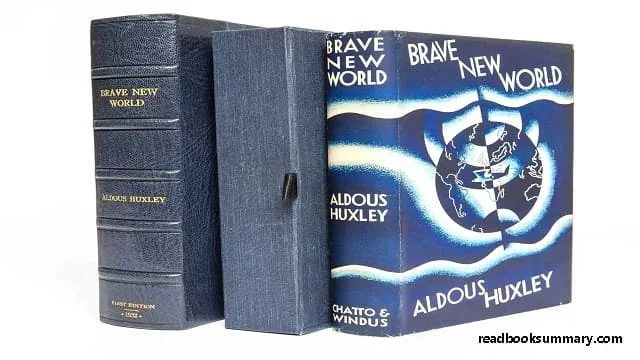 |
| brave new world synopsis |
 |
| huxley brave new world summary |
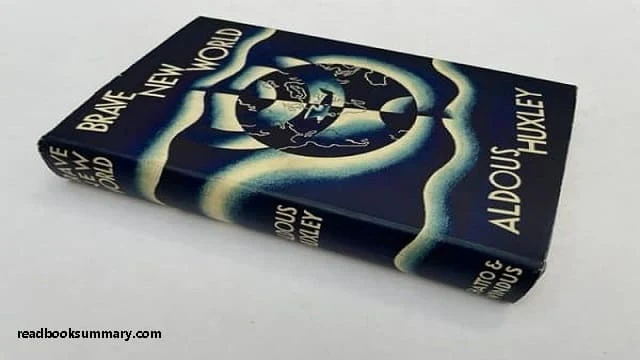 |
| brave new world novel summary |
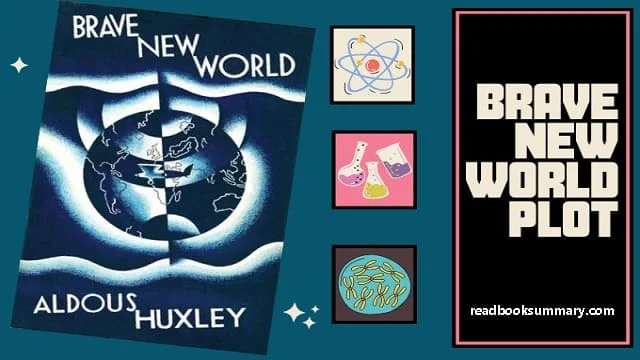 |
| book brave new world summary |
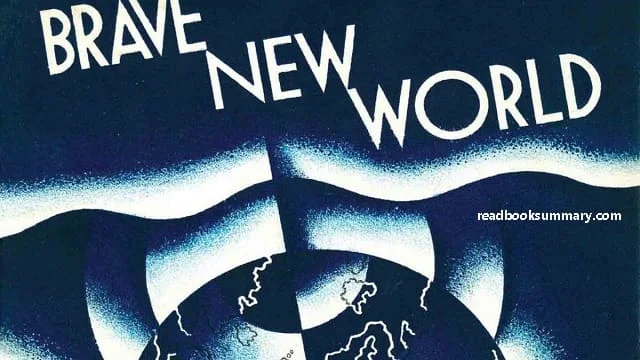 |
| brave new world chapter summary |
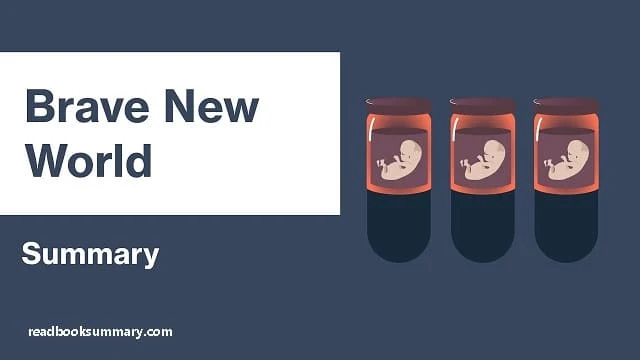 |
| brave new world plot summary |
 |
| brave new world aldous huxley synopsis |
Questions and Answers about Brave New World Plot
What is the main point of Brave New World? Brave New World warns of the dangers of giving the state control over new and powerful technologies. One illustration of this theme is the rigid control of reproduction through technological and medical intervention, including the surgical removal of ovaries, the Bokanovsky Process, and hypnopaedic conditioning.
What are the core values of Brave New World? In Brave New World, the dystopian novel by Aldous Huxley, the engineered people live by the words: 'Community, Identity, Stability.
What are the 3 rules in Brave New World? Welcome to New London, a utopia governed by three rules—no privacy, family or monogamy—where everyone belongs to everyone else. Bernard Marx is preoccupied with recent events in New London as he and Lenina Crowne take a trip together; John struggles with a dilemma.
Why is it important to read a Brave New World? 'Brave New World' by Aldous Huxley is a powerful and influential story. This dark book, deeply reflective of society and human nature, shifts the way hardships and adversity appear in the world around us. 'Brave New World' brings a perfect, horrifyingly blissful world into sharp focus.
Why is Brave New World a utopia? In presenting a world where society has been perfected and people live happily and peacefully, Brave New World is an example of a utopian novel. Taking its name from Sir Thomas More's 1516 novel Utopia, the genre of utopian novels posit that suffering can be eradicated through the perfection of society.
What are the conflicts in Brave New World? Conflict has many shapes in Brave New World. There are obvious conflicts, such as John adjusting to the fact that people like Bernard or Lenina want to use him (Bernard for fame, Lenina for sex), as well as the conflicts that erupt as Helmholtz and Bernard realize they don't fit into society.
What does John symbolize in Brave New World? In Brave New World, a 1932 novel by Aldous Huxley, the character of John the Savage represents the romanticized ideals of love and suffering in contrast to the people of the World State.
What is the motto of Brave New World? In the World State, the motto is "Community, Identity, and Stability." This captures the core belief that the community comes first; everyone knows who and what they are, and stability is the ultimate goal.
What are the 5 types of people in Brave New World? The different classes in Brave New World are not just social, but biological. The five castes, from the highest to the lowest, are Alphas, Betas, Gammas, Deltas, and Epsilons.
Is Brave New World a tragedy? The plot of Brave New World in fact includes most of the elements of classical and Shakespearean tragedy: conflict, isolation, the reestablishment of order at the cost of the protagonist's life.
Who is the protagonist in Brave New World? From the beginning of the novel until Bernard's visit to the Reservation, Bernard Marx is the protagonist. Bernard is an outsider in the World State. He is physically small, “eight centimeters short of the standard Alpha height,” which means that people make fun of him. Because he is an outsider, he feels unique.
What is the theme of happiness in Brave New World? In Brave New World, the stability of society is largely dependent on the happiness of the population. To that end, happiness is regarded as the utmost priority for World Controller, Mustapha Mond. If there is unhappiness, then the entire system will come crashing to a halt.
What is Huxley's message in Brave New World essay? The author of Brave New World, Aldous Huxley, is sending a message to the future through Brave New World, which is that the advanced stability and organization of society comes at a cost. This cost is culture from the past, individual freedoms, feelings like unhappiness or love, and uniqueness.
How does Brave New World relate to our society? The novel demonstrates an evolution in family and children. In this world, humans are no longer born, but rather cloned. While we do not exactly clone human beings in our society, we have the resources and technology to make cloning possible.
What is the opposite of Brave New World? The relatively unknown novel Island was written by Huxley at the end of his life, in 1962, and it depicts a world that is almost the complete opposite of Brave New World. 3 Pala is a small island in the Pacific, where for 120 years an ideal society has flourished.
What are the symbols in Brave New World? In a Brave New World the three main symbols are books and flowers, soma, and technology. These symbols are important in the novel's development and convey the theme and tone. Two intertwining symbols in the novel a Brave New World are the books and flowers.
What is the setting of Brave New World? Brave New World is set in the future of our own world, in the year 2450 A.D. The planet is united politically as the “World State.” The Controllers who govern the World State have maximized human happiness by using advanced technology to shape and control society.
What is the main conflict and theme? Conflict: Conflict represents the problem in the story. It can be internal if the character is battling with them or external if they are battling outside forces, such as another character or nature. Theme: Theme is the main point of the story.
Who is the main antagonist in Brave New World? Both Bernard and John face the same antagonist: the World State. The World State is a civilization whose only goals are stability and productivity.
Why is Brave New World ironic? When John and Lenina's cultural differences prevent them from recognizing that they both have fallen in love with one another, it is an example of dramatic irony. The audience knows how they feel, but they do not know each other's feelings.
What are the gender issues in Brave New World? Women in Brave New World are also subjected to inferior roles and intelligence, which portrays them as helpless beings. Other from their role in providing the eggs for producing the engineered babies, the other important role left for women in Brave New World is to provide men with sex.
Why is John called the Savage? John is labeled a savage in Brave New World because he rejects the society's values and prefers to live as people did in older times. Even though he rejects what society tells him is "civilized," John is closest in mindset and experience to what we consider "civilized" today.
Why does John reject Lenina? In John's eyes, if Lenina is not a prize to be won through suffering, then she must be a whore a "strumpet" to be scorned. John's early experience has taught him to associate sex with violence, and his conditioning suddenly takes over as his romantic vision of Lenina disappears.
Why is Lenina disgusted by Linda? Lenina finds Linda unattractive. Linda is overweight; she is missing teeth, and she is dirty and smells badly. Lenina is not used to seeing people who live outside of advanced civilization, where people's health and appearance are strictly controlled.
How does Brave New World end? Toward the end of the novel, Bernard and Helmholtz are sent away to the Falkland Islands because they participated in the riot at the hospital. Bernard has trouble accepting his fate; he responds hysterically and must be removed from the room after he hears the news.
Who first said Brave New World? The phrase 'Brave New Word' is most famously the title of a science fiction novel by Aldous Huxley, published in 1932. It's a phrase taken from Shakespeare's play, The Tempest.
